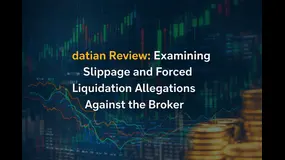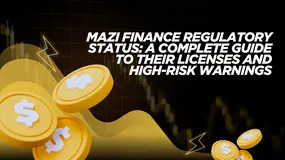WikiFX Valentine's Message | Trade Safely, Together Every Step of the Way
In the Forex Market, Trust Is Not a Promise — It’s Verified Through Safety, Transparency, and Support
简体中文
繁體中文
English
Pусский
日本語
ภาษาไทย
Tiếng Việt
Bahasa Indonesia
Español
हिन्दी
Filippiiniläinen
Français
Deutsch
Português
Türkçe
한국어
العربية
Abstract:The FSCA has outlined how it intends to promote transformation in the financial sector, both now and, more importantly, once the Conduct of Financial Institutions (Cofi) Bill becomes law. This week, the Authority released, for public comment, its draft strategy for promoting financial sector transformation.
The FSCA has outlined how it intends to promote transformation in the financial sector, both now and, more importantly, once the Conduct of Financial Institutions (Cofi) Bill becomes law.
This week, the Authority released, for public comment, its draft strategy for promoting financial sector transformation.
Cofi will empower the FSCA to set transformation targets for financial institutions and enforce them. The Authority will also be able to impose penalties for non-compliance.
National Treasury has previously stated that it aims to table Cofi by April.
The FSCA says it has adopted a two-phase approach to promoting transformation. Phase 1 focuses on the role that the FSCA will play within the current legislative framework, while the focus of Phase 2 is its role within Cofi.

The legislative and supervisory framework for transformation in the financial sector consists of:
The Broad-based Black Economic Empowerment Act (B-BBEEA). The B-BBEE Commission supervises adherence to the Act. The Act does not oblige enterprises to achieve specific B-BBEE targets. It does make it a criminal offence to misrepresent an enterprises BEE status.
The Financial Sector Code (FSC), which is set and monitored by the Financial Sector Transformation Council (FSTC). The council does not have the power to take action against enterprises that do not achieve the codes targets or that fail to report on their compliance with the code.
The Financial Sector Regulation Act (FSRA) and the Insurance Act. The Prudential Authority supervises the transformation requirements of the latter.
However, the provisions of the Insurance Act are an interim measure. Once Cofi takes effect, the FSCA will supervise the transformation of all financial institutions in terms of the FSRA and Cofi.
Cofi places requirements on financial institutions regarding transformation, including having a transformation plan and promoting transformation in line with that plan.
Enforcement action
According to the FSCAs draft strategy, one of the key strengths of the FSCA in supporting transformation of the financial sector is its ability to take enforcement action against financial institutions. This is in contrast to other stakeholders such as the FSTC, which is not able to sanction institutions, and even the B-BBEE Commission, whose administrative actions are limited to instances of fraud or misrepresentation.
“The FSCA will ultimately be able to take action against financial institutions that do not adhere to commitments made in terms of their transformation plans.”
In line with Cofi and the amended FSRA, the FSCA says it could do the following to promote transformation:
Require financial institutions to have a transformation plan aimed at achieving targets set under the FSC;
Set minimum B-BBEE levels that must be targeted by each firm, particularly larger firms;
Consider transformation plans during the licensing process;
Supervise the progress of financial institutions against their plans;
Take action when there is a lack of commitment to, or achievement of targets, set in transformation plans; and
Minimise regulatory barriers to entry for small, black-owned entities and support small black businesses with suitably enabling regulatory compliance requirements.
The FSCA says it is envisaged that all financial institutions with revenue of more than R10 million a year should have a B-BBEE score of Level 4 or have a transformation plan that demonstrates how they will reach this level within five years.
The Authority says that, in Phase 2 of its strategy, it could take the following action when financial institutions fail to meet the targets in their transformation plans:
Engaging with an institutions board on the importance of transformation;
Requesting a remedial plan to address the shortcomings, which can take the form of an enforceable undertaking;
Issuing a directive for non-compliance with an enforceable undertaking; and
Issuing an administrative penalty for non-compliance with Cofi Acts transformation requirements, an enforceable undertaking or a directive.
Phase 1 objectives
In the meantime, until Cofi takes effect, the FSCAs objectives will include:
Engaging with financial institutions on their transformation plans and levels of compliance. The FSCA will include “a transformation focus” during its engagements with financial institutions. The purpose will be to assess the current levels of transformation within the sector and evaluate the maturity of transformation plans that those institutions may have in place to improve their achievement of targets under the FSC over time.
Supporting the FSTC in collecting data on transformation, particularly in relation to ownership. The FSCA will also undertake a data collection and clean-up exercise to improve the information it holds regarding the ownership of licensed financial institutions.
Strengthening its engagements with the FSTC and the B-BBEE Commission, to improve the co-ordination of efforts aimed at promoting transformation of the financial sector.
Supporting small businesses in the financial sector. The FSCA says its Inclusive Business Model Support Unit will conduct training and support workshops for SMEs and entrepreneurs in the financial sector, focused on compliance, readiness for licensing, and support for regulatory examinations. In Phase 2, the units work will be expanded to include more general operational business support.
Developing licensing, regulatory and supervisory frameworks that promote transformation of the financial sector. The FSCA says that licensing, regulatory and supervisory requirements “should not in themselves pose a barrier to entry for small financial institutions, particularly those owned by previously disadvantaged individuals. In support of transformation, the FSCA will develop regulatory and supervisory frameworks and instruments that allow for proportional application of requirements, minimising undue barriers to entry and compliance burdens. Where appropriate, regulatory instruments may also introduce explicit requirements aimed at transformation.”
The FSCA says it will continue to participate in the development of the Cofi Bill and the consequential amendments to the FSRA, “to ensure that transformation is adequately provided for, in a way that can be appropriately regulated and supervised by the FSCA”.
Disclaimer:
The views in this article only represent the author's personal views, and do not constitute investment advice on this platform. This platform does not guarantee the accuracy, completeness and timeliness of the information in the article, and will not be liable for any loss caused by the use of or reliance on the information in the article.

In the Forex Market, Trust Is Not a Promise — It’s Verified Through Safety, Transparency, and Support

Did you face losses due to a sudden change in the trading price on the datian platform? Were your transaction records deleted by the Hong Kong-based forex broker? Did the broker liquidate your trading account multiple times despite not reaching the stage where it mandated this move? Have you experienced heavy slippage on the trading platform? Concerned by these issues, traders have complained about the broker online. We will let you know of these with attached screenshots in this datian review article. Keep reading!

Did you face constant rejections of your fund withdrawal applications by TopstepFX? Have you been denied withdrawals in the name of hedging? Did you witness an account block without any clear explanation from the forex broker? There have been numerous user claims against TopstepFX regarding its withdrawals, payout delays and other issues. In the TopstepFX review article, we have investigated the top complaints against the US-based forex broker. Keep reading!

When choosing a broker, the first question is always about safety and legitimacy. Is my capital safe? For Mazi Finance, the answer is clear and worrying: Mazi Finance is an unregulated broker. While the company, MaziMatic Financial Services LTD, is registered in the offshore location of Saint Lucia, this business registration does not replace strong financial regulation from a top-level authority. Independent analysis from regulatory watchdogs shows a very low trust score, made worse by official warnings from government financial bodies and many user complaints about serious problems. This article provides a clear, fact-based analysis of the Mazi Finance regulation status. Our goal is to break down the facts and present the risks clearly, helping you make an informed decision and protect your capital.
